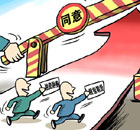-
-
China Daily E-paper
Web Comments
Sino-US relations, a bumpy road
By Yuan Boyang (chinadaily.com.cn)
Updated: 2010-02-02 13:28
 |
Large Medium Small |
In 2009, Sino-US relationship is too good to be true.
From Secretary of State Hilary Clinton, House Speaker Nancy Pelosi, to Treasury Secretary Timothy F. Geithner, US high officials came to China one after another. They advocated US-China cooperation and friendship, setting aside differences over Taiwan, Tibet, human rights and China's currency policies to combat the global economic crisis. President Barack Obama’s successful visit to China in November peaked the bilateral relations to a new high.
Mr. Obama pledged US welcomed China to play a larger role in international stages, "G2" has been the hottest word of 2009.
It seems that Obama is about to correct his "error" in New Year.
In the first week of 2010, the Pentagon cleared a sale of advanced Patriot air defense missiles to Taiwan. Despite of strong opposition and warnings from Beijing, on Jan. 29th, Obama administration formally notified Congress his proposal of $6.4b arms sales package.
In addition, Mrs. Clinton noted on Friday that Mr. Obama would soon be meeting with Dalai Lama, which will further infuriate Chinese government and Chinese people.
Internet freedom has been another source of tension between the two countries. After Google's announcement to retreat from China, Mrs. Clinton made a high-profile remark that internet freedom has been another pillar for US foreign policy, berating China's internet censorship and hacking attacks allegedly originated in China.
Besides, trade friction has haunted around the bilateral relationship even during the Sino-US "honeymoon". U.S. Commerce Secretary Gary Locke warned on Thursday, U.S. companies face too many obstacles trying to do business in China and could lose interest if Beijing backslides on openness and the rule of law.
Moreover, 2010 is US Congressional election year, the two parties will not hesitate to charge China's currency policy, export-oriented strategy, human-right records, etc.
Sino-US relations will be rough and bumpy in 2010, despite the two rivals have significant interest to share. The Obama government should exercise the political wisdom to put the Sino-US relations on the right track.














